Offshore
Fresh Leak Reheats Panama Papers Controversy

The new leak has found that the law firm at the heart of the Panama Papers scandal in 2016 could not identify the majority of the owners for companies it administered.
A new leak of documents from the offshore law firm at the center of the Panama Papers scandal in 2016, reveals the company could not identify the owners of up to three quarters of companies it administered, media reports have said.
According to the BBC, two months after becoming aware of the data breach, Mossack Fonseca was unable to identify the beneficial owners of more than 70 per cent of 28,500 active companies in the British Virgin Islands (BVI) as well as 75 per cent of companies in Panama. This publication reported in March that Mossack Fonseca, was closing down.
At the time, BVI law permitted corporate service providers to rely upon intermediaries, banks, legal firms and other offshore service providers overseas to check the identities of the owners, although they were required to provide information if requested by the authorities.
The firm was fined $440,000 by the BVI Financial Services Commission in November 2016 for regulatory and legal infringements of anti-money laundering and other laws.
The massive haul of data from Mossack Fonseca - a saga dubbed the Panama Papers - was the most dramatic case yet of such information being put into the public domain, stirring controversy about the dividing line between legitimate financial privacy and secrecy. The saga has fuelled calls for more disclosure about beneficial ownership of trusts and companies: the UK has already pushed for such registers of beneficial ownership, causing anger in locations such as the BVI and Cayman Islands. The Panama Papers leak caused political controversies in countries including Iceland, the UK and Malta, where there were claims of political figures and those connected to them in using offshore accounts.
The new leak contains 1.2 million documents dating from before the Panama Papers went public in April 2016 to December 2017. The data was obtained by Suddeutsche Zeitung.
The BVI and other British Overseas Territories have created registers of beneficial ownership for companies in their jurisdictions. But the register relies upon offshore service providers, like Mossack Fonseca, to provide the information. And it is only directly accessible to authorities in the BVI - the public cannot see it. The BVI denies the register is secret and says it is accessible to the authorities and relevant UK authorities on request within one hour.
"A public register is not a silver bullet,” a spokesman for BVI told the BBC. “It is not about who can see the information, it's about the information being verified, accurate, and therefore useful to law enforcement. A verified register is a far more robust and effective approach to ensure transparency than an unverified public register."
Last month, the UK government adopted an amendment to its Sanctions and Anti-Money Laundering Bill to force overseas territories to establish public registers by 2020.
In November 2017, the UK tax authority, HMRC, revealed there were 66 ongoing investigations related to the Panama Papers and that they expected to recover £100 million ($133 million) in tax.
This publication has covered the controversy over registers extensively; to see a report from 2016, for example, click here.
